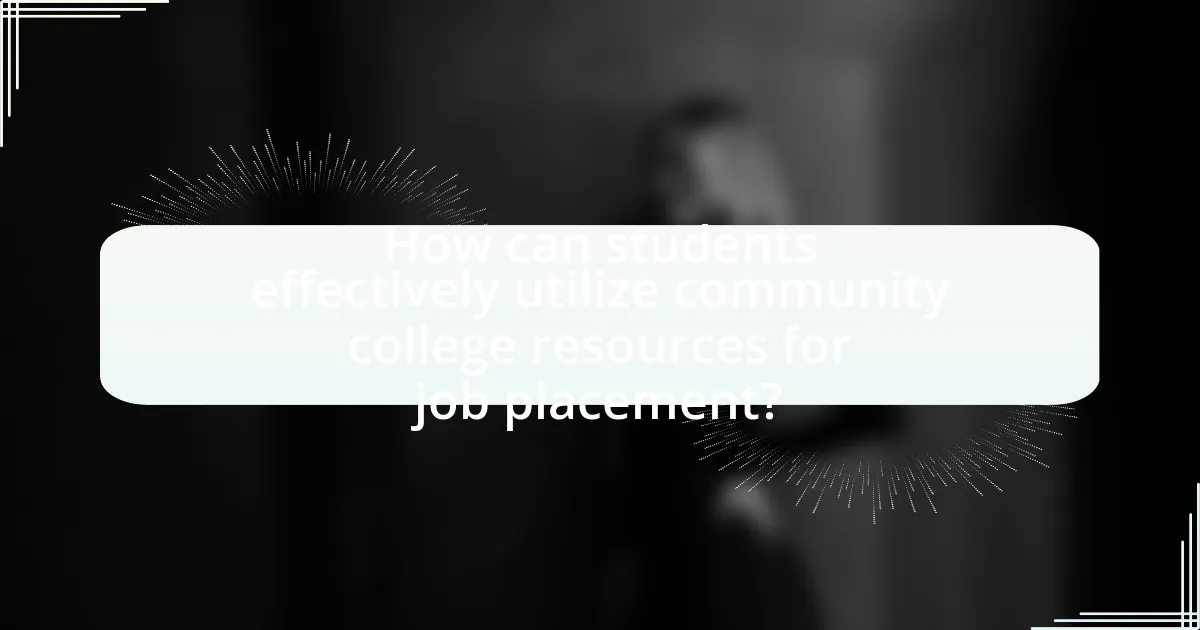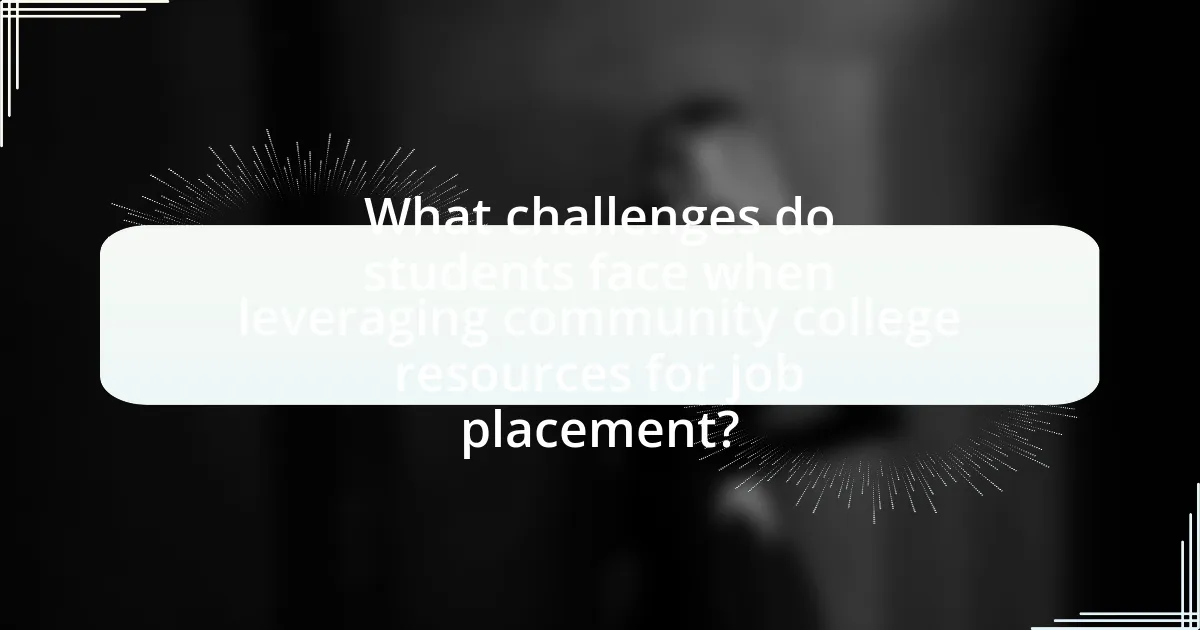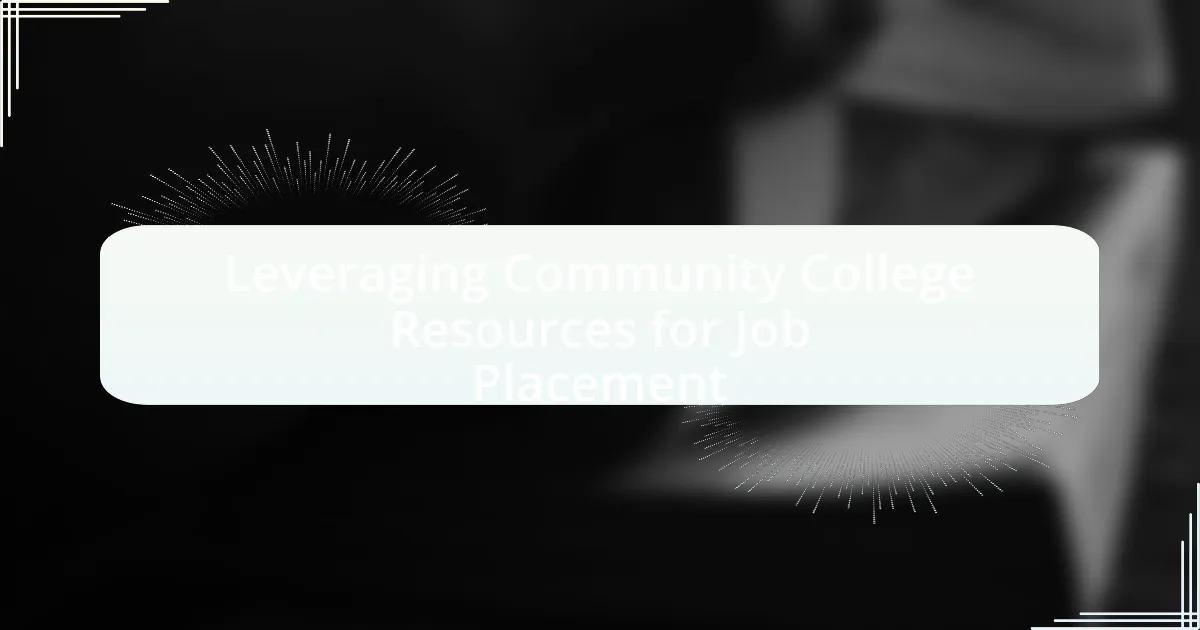Community colleges play a vital role in job placement by offering a range of resources such as career services, job fairs, internship programs, and partnerships with local employers. These resources are designed to enhance students’ employability through personalized career counseling, resume workshops, and networking opportunities. The effectiveness of these initiatives varies among institutions, influenced by factors like funding and industry connections. By actively engaging with these resources, students can significantly improve their job placement outcomes and better align their skills with local labor market demands.

What are Community College Resources for Job Placement?
Community colleges offer various resources for job placement, including career services, job fairs, internship programs, and partnerships with local employers. Career services typically provide resume workshops, interview preparation, and job search assistance, helping students navigate the job market effectively. Job fairs organized by community colleges connect students directly with potential employers, facilitating networking opportunities. Additionally, internship programs allow students to gain practical experience while earning academic credit, enhancing their employability. Partnerships with local businesses often lead to job placement opportunities tailored to the skills and training provided by the college, ensuring that graduates are well-prepared for the workforce.
How do community colleges support job placement initiatives?
Community colleges support job placement initiatives by providing tailored career services, including job fairs, resume workshops, and internship opportunities. These institutions often collaborate with local businesses and industries to align their programs with workforce needs, ensuring that students acquire relevant skills. For instance, a study by the American Association of Community Colleges found that 70% of community colleges have partnerships with employers to facilitate job placements, demonstrating their commitment to connecting students with job opportunities.
What specific resources do community colleges offer for job seekers?
Community colleges offer a variety of specific resources for job seekers, including career counseling services, job placement assistance, resume workshops, and access to job fairs. Career counseling services provide personalized guidance to help individuals identify their strengths and career goals. Job placement assistance connects students with potential employers and job openings, often through partnerships with local businesses. Resume workshops teach job seekers how to effectively present their skills and experiences, while job fairs provide opportunities to meet employers and explore job options in person. These resources are designed to enhance employability and facilitate successful job placements for community college students.
How do these resources vary between different community colleges?
Resources for job placement vary significantly between different community colleges, influenced by factors such as funding, partnerships with local businesses, and available programs. For instance, some community colleges may have robust career services that include job fairs, internship opportunities, and personalized counseling, while others may lack these resources due to limited budgets or fewer industry connections. According to the American Association of Community Colleges, colleges with strong ties to local industries often provide better job placement rates, demonstrating that the extent and quality of resources directly impact student outcomes in employment.
Why is leveraging community college resources important for job placement?
Leveraging community college resources is important for job placement because these institutions provide tailored support services that enhance employability. Community colleges often offer career counseling, job fairs, and internship opportunities, which connect students with local employers. According to the American Association of Community Colleges, 70% of community college students engage in work-study programs or internships, significantly increasing their chances of securing employment after graduation. Additionally, community colleges frequently collaborate with businesses to align curricula with industry needs, ensuring that graduates possess relevant skills sought by employers.
What advantages do community college resources provide to students?
Community college resources provide students with access to affordable education, career services, and personalized support, enhancing their job placement opportunities. These institutions often offer lower tuition rates compared to four-year universities, making higher education more accessible. Additionally, community colleges typically have dedicated career centers that assist students with job search strategies, resume writing, and interview preparation, which are crucial for successful employment. According to the American Association of Community Colleges, nearly 80% of community college students report that their institution helped them develop skills relevant to their career goals, demonstrating the effectiveness of these resources in facilitating job placement.
How do community college resources impact local job markets?
Community college resources significantly enhance local job markets by providing targeted training programs that align with regional employment needs. These institutions often collaborate with local businesses to develop curricula that equip students with relevant skills, thereby increasing employability. For instance, a report from the American Association of Community Colleges indicates that 80% of community college graduates find jobs in their field within six months of graduation, demonstrating the effectiveness of these resources in meeting local labor demands. Additionally, community colleges often offer career services, internships, and job placement assistance, which further facilitate connections between graduates and employers, ultimately strengthening the local economy.

How can students effectively utilize community college resources for job placement?
Students can effectively utilize community college resources for job placement by actively engaging with career services, attending workshops, and networking with local employers. Career services provide personalized guidance, resume reviews, and interview preparation, which are essential for job readiness. Workshops often cover topics such as job search strategies and professional development, equipping students with necessary skills. Additionally, networking events and job fairs organized by community colleges connect students directly with potential employers, enhancing their job prospects. According to the American Association of Community Colleges, 70% of community college students who utilize these resources report improved job placement outcomes.
What steps should students take to access these resources?
Students should first identify the specific resources available at their community college, such as career services, job placement offices, and internship programs. Next, they should visit the college’s website or contact the relevant departments to gather information on how to utilize these resources effectively. Additionally, students should attend workshops or informational sessions offered by the college to learn about job search strategies and networking opportunities. Engaging with faculty and career advisors can also provide personalized guidance tailored to their career goals. Accessing these resources is crucial, as studies show that students who utilize career services are more likely to secure employment after graduation.
How can students identify the most relevant resources for their career goals?
Students can identify the most relevant resources for their career goals by conducting thorough research on available community college services, networking with professionals in their desired fields, and utilizing career counseling services. Community colleges often provide access to job placement centers, internship opportunities, and workshops that align with specific career paths. For instance, a study by the American Association of Community Colleges found that 70% of community college students who engaged with career services reported improved job placement rates. By actively participating in these resources, students can gain insights and connections that directly support their career aspirations.
What role do career services play in this process?
Career services play a crucial role in facilitating job placement for community college students by providing essential resources and support. These services offer career counseling, resume writing assistance, interview preparation, and job search strategies tailored to the needs of students. According to a report by the National Association of Colleges and Employers, 70% of employers prefer candidates with internship experience, which career services help students secure through partnerships with local businesses. Additionally, career services often host job fairs and networking events, connecting students directly with potential employers, thereby enhancing their employment opportunities.
What strategies can enhance the effectiveness of community college resources?
Enhancing the effectiveness of community college resources can be achieved through targeted partnerships with local businesses and industries. These partnerships facilitate internships and job placements, directly connecting students with potential employers. For instance, a study by the Community College Research Center found that students who participated in work-based learning programs had a 20% higher employment rate post-graduation compared to those who did not engage in such programs. Additionally, implementing comprehensive career services that include resume workshops, interview preparation, and networking events can further support students in their job search efforts. By focusing on these strategies, community colleges can significantly improve the outcomes for their students in the job market.
How can networking with alumni improve job placement outcomes?
Networking with alumni can significantly improve job placement outcomes by providing current students with access to job opportunities, mentorship, and industry insights. Alumni often have established careers and can offer valuable connections to employers, which can lead to job referrals. According to a study by the National Association of Colleges and Employers, 85% of jobs are filled through networking, highlighting the importance of alumni connections in the job search process. Additionally, alumni can share their experiences and advice on navigating the job market, enhancing students’ preparedness and confidence. This direct engagement with alumni creates a supportive community that fosters professional growth and increases the likelihood of successful job placements.
What role do internships and co-op programs play in leveraging resources?
Internships and co-op programs serve as critical mechanisms for leveraging resources by providing students with practical experience and industry connections. These programs enable students to apply theoretical knowledge in real-world settings, enhancing their employability and skill sets. According to a study by the National Association of Colleges and Employers, 60% of interns receive job offers from their internship employers, demonstrating the effectiveness of these programs in facilitating job placement. Additionally, internships and co-ops often lead to networking opportunities that can result in mentorship and job referrals, further amplifying the resources available to students in their career pursuits.

What challenges do students face when leveraging community college resources for job placement?
Students face several challenges when leveraging community college resources for job placement, including limited access to career services, lack of awareness about available resources, and insufficient networking opportunities. Limited access to career services often results from underfunded programs, which can hinder students from receiving adequate guidance and support. Additionally, many students may not be fully aware of the resources available to them, such as job fairs, resume workshops, and internship programs, leading to missed opportunities. Furthermore, insufficient networking opportunities can restrict students’ ability to connect with potential employers, as community colleges may not have strong ties with local industries. These challenges collectively impede students’ successful transition into the job market.
What common obstacles hinder effective use of these resources?
Common obstacles that hinder effective use of community college resources for job placement include lack of awareness, insufficient funding, and limited access to industry connections. Many students are unaware of the available resources, such as career counseling and job fairs, which can significantly impact their job placement success. Additionally, community colleges often face budget constraints that limit the development and promotion of these resources, reducing their effectiveness. Furthermore, the lack of strong partnerships with local businesses can restrict students’ access to internships and job opportunities, ultimately affecting their employability.
How can students overcome these challenges?
Students can overcome challenges in job placement by actively utilizing community college resources such as career services, internships, and networking opportunities. Engaging with career services provides students with access to resume workshops, interview preparation, and job fairs, which are essential for enhancing employability. Internships offer practical experience and industry connections, increasing the likelihood of job offers post-graduation. Additionally, networking events organized by community colleges facilitate relationships with local employers, which can lead to job opportunities. Research indicates that students who participate in these resources are 50% more likely to secure employment within six months of graduation, demonstrating the effectiveness of leveraging community college resources for job placement.
What support systems are in place to assist students facing these challenges?
Community colleges provide various support systems to assist students facing challenges in job placement. These systems include career counseling services, job placement offices, internship programs, and partnerships with local businesses. Career counseling services offer personalized guidance to help students identify their career goals and develop job search strategies. Job placement offices actively connect students with employment opportunities through job fairs and employer networking events. Internship programs provide hands-on experience, enhancing students’ resumes and making them more competitive in the job market. Additionally, partnerships with local businesses facilitate direct recruitment and job placement for students, ensuring they have access to relevant job opportunities.
What best practices can students follow to maximize job placement success?
Students can maximize job placement success by actively engaging with career services offered by their community college. Utilizing resources such as resume workshops, interview preparation sessions, and job fairs can significantly enhance their employability. According to a study by the National Association of Colleges and Employers, students who participate in career services are 50% more likely to secure employment after graduation. Additionally, networking with alumni and industry professionals through college-sponsored events can provide valuable connections and insights into job opportunities.
How can students create a personalized job placement plan using available resources?
Students can create a personalized job placement plan by utilizing resources such as career services, workshops, and networking opportunities offered by their community college. Career services provide tailored guidance, including resume reviews and interview preparation, which are essential for job readiness. Workshops often cover industry-specific skills and job search strategies, enabling students to align their qualifications with market demands. Networking opportunities, such as job fairs and alumni events, facilitate connections with potential employers, enhancing job placement prospects. According to a study by the National Center for Education Statistics, community colleges that actively engage students in these resources report higher job placement rates, demonstrating the effectiveness of leveraging available support for personalized job placement planning.
What tips can help students stay motivated during their job search?
Students can stay motivated during their job search by setting clear, achievable goals and maintaining a structured routine. Establishing specific targets, such as applying to a certain number of jobs each week, helps create a sense of purpose and progress. Additionally, utilizing community college resources, such as career counseling and job fairs, can provide valuable support and networking opportunities, which can enhance motivation. Research indicates that students who actively engage with available resources are more likely to secure employment, as they gain access to job leads and professional development workshops.

Leave a Reply